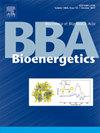Engineering of thermal stability in the recombinant xanthorhodopsin from Salinibacter ruber
IF 2.7
2区 生物学
Q2 BIOCHEMISTRY & MOLECULAR BIOLOGY
引用次数: 0
Abstract
Solubilization in detergents is a widely used technique for the isolation of membrane proteins and the study of their properties. Unfortunately, protein stability in detergent micelles can sometimes be compromised. We encountered this issue with xanthorhodopsin (XR) from Salinibacter ruber, which had been previously engineered for expression in Escherichia coli cells. To explore the factors affecting stability and to enhance thermal stability of recombinant XR preparations following solubilization of membranes using n-dodecyl-β-D-maltopyranoside and nickel-affinity chromatography, we developed a series of hybrid proteins based on the homology between XR and a stable rhodopsin from Gloeobacter violaceus (GR). Functional studies of these hybrids and measurements of their melting temperatures revealed the structural elements of XR that account for its notable difference in stability compared to GR, despite their high overall homology of approximately 50 % identical residues.
In particular, XR variants with an engineered loop between transmembrane helices D and E, similar to that in GR, demonstrated enhanced stability. However, we found that replacing the DE loop affects carotenoid binding. Additionally, two hybrid proteins containing the C and D helices from GR exhibited increased stability as well as improved photocycle and proton transport rates. In conclusion, we have demonstrated that optimizing the amino acid sequence of xanthorhodopsin from S. ruber based on its homology with Gloeobacter rhodopsin is an effective approach to enhance its thermal stability in vitro and improve its potential for optogenetic applications.

重组橡胶盐碱菌黄杉质热稳定性的工程研究
洗涤剂中的增溶是一种广泛应用于膜蛋白分离及其性质研究的技术。不幸的是,洗涤剂胶束中的蛋白质稳定性有时会受到损害。我们在使用来自橡胶盐碱杆菌的XR时遇到了这个问题,XR先前被设计用于在大肠杆菌细胞中表达。为了探索影响XR稳定性的因素,并利用n-十二烷基-β- d -麦芽吡喃苷和镍亲和层析法提高膜增溶后重组XR制剂的热稳定性,我们基于XR与Gloeobacter violaceus (GR)中稳定的紫红质的同源性,开发了一系列杂交蛋白。对这些杂合体的功能研究和熔融温度的测量揭示了XR的结构元素,这些结构元素解释了XR与GR相比稳定性的显著差异,尽管它们的总体同源性约为50%相同的残基。特别是,在跨膜螺旋D和E之间带有工程环的XR变异,与GR相似,表现出更高的稳定性。然而,我们发现替换DE环会影响类胡萝卜素的结合。此外,含有GR的C和D螺旋的两种杂交蛋白表现出更高的稳定性,并改善了光循环和质子运输速率。综上所述,基于与Gloeobacter rhodopsin的同源性,优化橡胶树黄紫质的氨基酸序列是提高其体外热稳定性和光遗传学应用潜力的有效途径。
本文章由计算机程序翻译,如有差异,请以英文原文为准。
求助全文
约1分钟内获得全文
求助全文
来源期刊

Biochimica et Biophysica Acta-Bioenergetics
生物-生化与分子生物学
CiteScore
9.50
自引率
7.00%
发文量
363
审稿时长
92 days
期刊介绍:
BBA Bioenergetics covers the area of biological membranes involved in energy transfer and conversion. In particular, it focuses on the structures obtained by X-ray crystallography and other approaches, and molecular mechanisms of the components of photosynthesis, mitochondrial and bacterial respiration, oxidative phosphorylation, motility and transport. It spans applications of structural biology, molecular modeling, spectroscopy and biophysics in these systems, through bioenergetic aspects of mitochondrial biology including biomedicine aspects of energy metabolism in mitochondrial disorders, neurodegenerative diseases like Parkinson''s and Alzheimer''s, aging, diabetes and even cancer.
 求助内容:
求助内容: 应助结果提醒方式:
应助结果提醒方式:


